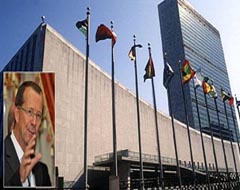After decades of dictatorship followed by invasion and conflict, Iraqis began this year with a chance to build a peaceful future. If not managed carefully, however, a lingering issue from the past could stain this moment of opportunity with tragedy.
past could stain this moment of opportunity with tragedy.
I am referring to the situation of Camp Ashraf, where a tense standoff has persisted between the government of Iraq and an Iranian opposition group, the Mujahedeen-e Khalq (MEK), which for the last 25 years has occupied a self-enclosed camp only a few hours drive from Baghdad.
The government has made it clear that it wants Camp Ashraf shut down and MEK — which once fought alongside Saddam Hussein and is designated by the United States and some other governments as a terrorist organization — to leave Iraq. Baghdad sees its presence, in a place which is off-limits to the government, as an affront to national sovereignty.
At the same time, there are very real concerns about what closing this camp would mean for the human rights, safety and welfare of the approximately 3,400 residents of Camp Ashraf. The United Nations strongly shares these concerns, which have been underscored vocally by the group’s supporters internationally, among them a number of U.S. and European officials and former officials.
There should be no confusion about the stance of the United Nations. We support only a peaceful, humanitarian solution for Camp Ashraf. We have been working hard to facilitate such an outcome — one that both respects Iraq’s sovereignty and provides the people of Camp Ashraf with a safe and voluntary path to a more hopeful life outside of Iraq.
When the Iraqi government announced late last year that it would be closing the camp by Dec. 31, the U.N. secretary general, Ban Ki-moon, spoke with Prime Minister Nuri al-Maliki to ask for more time for negotiation. Many feared a repeat of the violence of April 2011, when dozens of Ashraf residents were killed in clashes with Iraqi security forces at the camp.
The United Nations welcomed Mr. Maliki’s decision to extend the deadline until April. We have carried out an exhaustive and impartial diplomatic effort since then, with the support of the United States and the European Union, to encourage a peaceful solution. We have gone the extra mile to consult with Camp Ashraf residents and their leadership in order to address their concerns.
The plan now agreed to by the Iraqi government should be given a chance to work.
As a first step, it calls for the camp residents to voluntarily relocate to a transit site at the Baghdad airport. In contrast to Camp Ashraf, this site would be monitored around the clock by observers from the United Nations. There, the residents would be interviewed by the U.N. refugee agency, the UNHCR, to determine their eligibility for refugee status, paving the way for their resettlement outside of Iraq. Most have filed refugee claims. A small number have returned to Iran in recent years, but many others will want to go elsewhere.
Under the same agreement, the government of Iraq has made two key commitments that it must uphold. First, it has accepted full responsibility for the safety and security of the residents, from the relocation process throughout their stay at the new facility. Secondly, it has promised that nobody would be forced to go to Iran or elsewhere against their wishes.
The new site is a former U.S. Marine base that can hold more than 5,000 people. It has been equipped at considerable expense to receive the residents of Camp Ashraf. It has cooking and medical facilities, space for recreational activities and provisions for women and religious observance. UNHCR has carried out a careful technical assessment and determined that the new camp meets the humanitarian standards it applies for refugee situations around the world.
The process has arrived at a moment of truth.
After agreeing in principle to move an initial group of 400 residents, Camp Ashraf’s leaders have hesitated in recent days to begin the move, placing new conditions that the Iraqi government rejects. The government’s patience is wearing thin, and further delay could lead to provocation and violence.
I am concerned that the perfect is becoming the enemy of the good. Change is understandably unsettling for the residents, but maintaining the status quo is neither a safe nor viable option.
The relocation of the camp residents is of course only a bridge to a longer-term solution — their resettlement outside Iraq. Without this, the horizon is unclear.
We are calling on the international community — particularly the United States and Europe, which have long traditions of accepting refugees — to confirm publicly their readiness to accept eligible residents. Supporters in the U.S. Congress and the European Parliament could do their part by backing the relocation plan and taking the necessary steps to find a home for the residents.
Equally importantly, we are reminding the government of Iraq of its commitments. Impatience should not lead to miscalculation. Any violent solution would be totally unacceptable.
Time is running out, and lives are at stake. All concerned parties — camp residents, the Iraqi government and the international community — must do their part to ensure that the peaceful path is the route taken on Camp Ashraf.
Martin Kobler is the special representative of the U.N. secretary general for Iraq.
By MARTIN KOBLER

